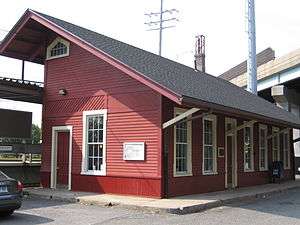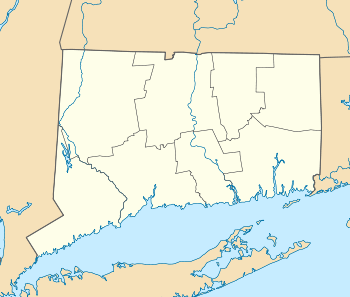Cos Cob (Metro-North station)
Cos Cob | |||||||||||
|---|---|---|---|---|---|---|---|---|---|---|---|
 West side of the station house | |||||||||||
| Location |
1 Station Drive, Cos Cob, CT 06807-2736 | ||||||||||
| Line(s) | |||||||||||
| Platforms | 2 side platforms | ||||||||||
| Tracks | 4 | ||||||||||
| Construction | |||||||||||
| Parking | 567 spaces | ||||||||||
| Other information | |||||||||||
| Fare zone | 15 | ||||||||||
| History | |||||||||||
| Opened | December 25, 1848 | ||||||||||
| Rebuilt | 1890 | ||||||||||
| Electrified | 12,500V (AC) overhead catenary | ||||||||||
| Traffic | |||||||||||
| Passengers (2006) |
215,020[1] | ||||||||||
| Services | |||||||||||
| |||||||||||
|
Cos Cob Railroad Station | |||||||||||
 | |||||||||||
| Location | Greenwich, Connecticut, USA | ||||||||||
| Coordinates | 41°1′52″N 73°35′54″W / 41.03111°N 73.59833°WCoordinates: 41°1′52″N 73°35′54″W / 41.03111°N 73.59833°W | ||||||||||
| Built | 1894 | ||||||||||
| Architectural style | Stick/Eastlake | ||||||||||
| NRHP Reference # | 89000928 | ||||||||||
| Added to NRHP | August 28, 1989 | ||||||||||
The Cos Cob Metro-North Railroad station serves the residents of the Cos Cob area of Greenwich, Connecticut, via the New Haven Line.
Cos Cob is 29.6 miles (47.6 km) from Grand Central Terminal. The station has 567 parking spaces, 361 owned by the state.[2]
Built in about 1890, the station was listed on the National Register of Historic Places in 1989 as Cos Cob Railroad Station.[3] The nearby Mianus River Railroad Bridge is also listed on the National Register. The Cos Cob Power Station, a former New Haven Railroad electrical substation on the western edge of that bridge is also NRHP-registered despite being demolished during the turn of the millennium.
History

"On Christmas Day, 1848, the last rails were laid over the Cos Cob Bridge, thereby supplying the last link needed to complete the railroad from New Haven to New York," according to the Stamford Historical Society Web site. "The first trial run was made on that day."[4]
Editors of two Stamford newspapers reported on the event. William H. Holly, Esq., founder of the Stamford Sentinel and a guest on the first trial run, wrote: "The train had to remain at Cos Cob Bridge some three hours for the last rails to be laid over it and the delay gave ample opportunity to the people to come and witness the wonderful feat. The general impression among them seemed to be, that the first train that attempted to cross this pass would also be the last."[4]
Edgar Hoyt, editor of the Stamford Advocate: "The citizens of the village as well as the horses, cattle, etc., were nearly frightened out of their propriety ... by such a horrible scream as was never heard to issue from any other than a metallic throat. Animals of every description went careening round the fields, snuffling the air in their terror."[4]
Platform and track configuration
| 3 | ■ New Haven Line | for Grand Central |
| 1 | ■ New Haven Line | no stop |
| ■ Northeast Corridor | no stop | |
| 2 | ■ New Haven Line | no stop |
| ■ Northeast Corridor | no stop | |
| 4 | ■ New Haven Line | for Stamford |
This station has two high-level side platforms each six cars long. The northern platform, adjacent to Track 3, is generally used by westbound trains. The southern platform, adjacent to Track 4, is generally used by eastbound trains.
The New Haven Line has four tracks at this location. The two inner tracks, not adjacent to either platform, are used only by express trains.
See also
- Connecticut Rail Commuter Council is the official state advocate for commuters and brings station problems to the attention of officials.
- National Register of Historic Places listings in Greenwich, Connecticut
References
- ↑ Using 260 weekdays in a year multiplied by number of weekday passengers (827)
- ↑ Urbitran Associates Inc. (July 2003). "Table 1: New haven Line Parking Capacity and Utilization" (PDF). Task 2: Technical Memorandum parking Inventory and Utilization: Final Report. p. 6. Archived from the original (PDF) on 2007-07-12.
- ↑ Bruce Clouette (August 29, 1988). "National Register of Historic Places Registration: Cos Cob Railroad Station" (PDF). National Park Service. and Accompanying six photos, exterior and interior, from 1988 (see photo captions page 9 of text document)
- 1 2 3 "Murals: Scenes from Yesteryear". Stamford Historical Society. Retrieved 2006-08-25.
External links
![]() Media related to Cos Cob (Metro-North station) at Wikimedia Commons
Media related to Cos Cob (Metro-North station) at Wikimedia Commons
- Metro-North Railroad - Cos Cob
- List of upcoming train departure times and track assignments from MTA
- Condition Inspection for the Cos Cob Station; Connecticut Department of Transportation report, November 2002
- Fairfield County Listings on the National Register of Historic Places

